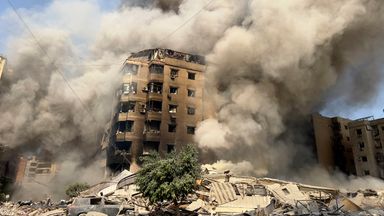On Saturday, Ayatollah Ali Khamenei, Iran's supreme leader, threatened to levy "even more crushing" blows against Israel after the country confirmed it killed Hezbollah leader Hassan Nasrallah in Lebanon's capital the day before.
Hezbollah confirmed Saturday that its leader of more than three decades was killed in an Israeli airstrike in southern Beirut. Nasrallah led Hezbollah in various clashes and armed conflicts against Israel and most recently, used rocket fire to push back against Israel's multiple operations in Gaza following Hamas' attack on October 7, 2023.
The United States designated Hezbollah as a terrorist organization in 1997. Hezbollah's military wing is considered to be stronger than the Lebanese army. The group also has a political arm, which in certain regions is integrated in parts of everyday Lebanese life, including providing social services like health care.
Iran backs Hezbollah and Hamas, and has no diplomatic ties with Israel, which Iranian officials often refer to not by name but as "the Zionist regime."
Iranian state media reported that Iran's Revolutionary Guards Corps (IRGC) deputy commander Abbas Nilforoushan was also killed in the Israeli strikes. According to Reuters, Khamenei has been transferred to a secure location within the country.
On Saturday evening, Khamenei posted several times to his English X, formerly Twitter, account in which he said Nasrallah "achieved martyrdom," and offered a "path and a school of thought."
In one post, he warned, "By the grace and power of God, the blows struck by the Resistance Front on the worn-out, deteriorating body of the Zionist regime will become even more crushing."
In a similar vein, Iran's First Vice President Mohammad Reza Aref, warned that this "unjust bloodshed" will "bring about their [Israel's] destruction," Iran's ISNA news agency reported on Saturday.
Iran has previously vowed revenge over the July killing of Hamas leader Ismail Haniyeh, who was taken out an apparent Israeli strike in Tehran, but no official military retaliation has occurred.
Newsweek reached out to the Israel Defense Force for comment via email on Saturday evening.
Director of the Middle East Institute's Iran program, Alex Vatanka, told Newsweek in a phone interview on Saturday afternoon, "There are lots of options in terms of retaliation [for Iran to take], but there are also reactions and ramification to those actions," adding that it is "very clear, that they don't want to go to war."
Vatanka noted that Iran "genuinely believes it's not just Israel it is going to have to fight, it's also the United States," but in addition, going to war "could topple the regime in Tehran, because that's what fundamentally is being protected here by Khamenei. He is worried about the survival of the regime."
Over the past two years, Iran has experienced an increase in protest movements against the government, with demonstrators advocating for women's rights, greater freedoms, and opposing the crippling inflation and struggling economy.
Vatanka added on Saturday that "[Iran is] shell shocked, they are so deeply shaken by the penetration of the highest echelons of the Axis of Resistance." The term refers to the informal Iranian led coalition in the region, including Hezbollah, the Houthis, Hamas, and others.
In other X posts, Khamenei called upon the Islamic community, ummah, to "stand with the people of Lebanon and the honorable Hezbollah, offering their resources and assistance." He also announced, "five days of public mourning in Islamic Iran."
Vatanka said "talk of Muslim solidarity against Israel amounts to nothing in practice."
Newsweek has also reached out to Iran's foreign ministry for comment via email on Saturday.
In his first public statement since Nasrallah's death, Israeli Prime Minister Benjamin Netanyahu said, "We settled the score with the one responsible for the murder of countless Israelis and many citizens of other countries, including hundreds of Americans and dozens of French," as reported by Agence France Presse (AFP).
The news of Nasrallah's death comes after the Israeli military has leveled several high-rise buildings and apartments in the Lebanese capital. As of Saturday, at least six people were killed and 91 wounded according to the Associated Press.
Lebanon has experienced a brutal week of intensified Israeli strikes, which have killed more than 490 people and injured 1,645, according to the AP. The most recent strikes werepreceded by two deadly attacks widely considered to be executed by Israel on Lebanese soil using booby-trapped pagers. Israel has not publicly claimed credit for the attacks or denied responsibility, and a United States official, speaking on condition of anonymity, told the AP that Israel briefed the U.S. on the operation.
Hezbollah members were targeted, however, numerous civilians, including children and medical workers, have been injured, maimed, and killed as the pagers exploded in public spaces and homes earlier this month.
Estimates suggest dozens have been killed and more than 3,000 have been injured. Iranian ambassador to Lebanon Mojtaba Amani, was injured in the blasts and arrived at a hospital for treatment.
While it is unknown what the future of Hezbollah is or how the next leader might coordinate with Iran, Vatanka told Newsweek that "Hezbollah is the brainchild of the Islamic Republic, no doubt about it. But it is a Lebanese organization operating in a Lebanese environment."
He added: "The Axis of Resistance today is not this formidable fighting force that Iran certainly has been advertising, or a lot of critics of Iran have been warning about. It's proven to be much weaker."
Disclaimer: The copyright of this article belongs to the original author. Reposting this article is solely for the purpose of information dissemination and does not constitute any investment advice. If there is any infringement, please contact us immediately. We will make corrections or deletions as necessary. Thank you.




